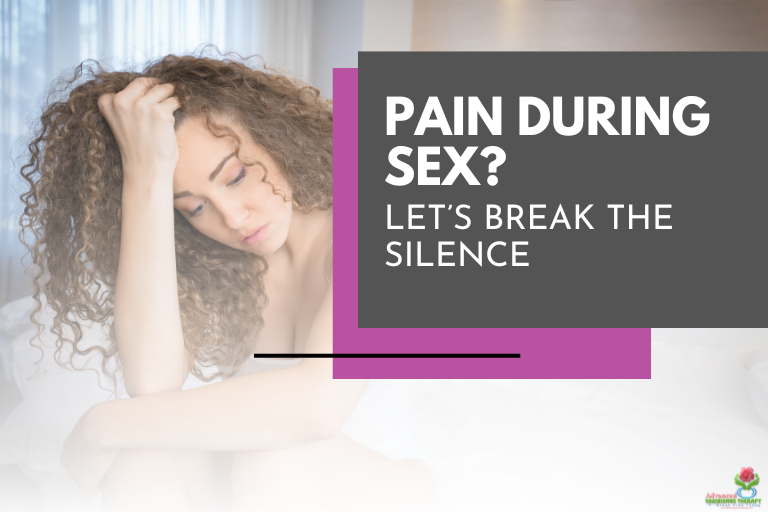Contents
Honesty is the best policy. . .until it’s not.
Breaking taboos around topics like sexual health can be both freeing and frustrating. There are so many cultural expectations when it comes to sex, what feels and looks good, what doesn’t. What you’re expected to just “know” when you have sex with someone.
So, what if everything hasn’t been great during sex? Or maybe you’ve even been having trouble with things like inserting a tampon, or a routine exam. How do you break the silence surrounding something that’s not widely spoken of?
A LITTLE BIT OF OUR STORY:
First, let me say that this was something me and my wife had to deal with from the get-go in our relationship. You can read our more detailed story here: https://advancedvaginismustherapy.com/about/ but know that I’m speaking up to break the silence on this because I believe every person deserves the healing and openness that talking about something like this brings.
I believe that being able to empathize with someone else’s experience is powerful and being able to help someone walk through something you’ve already experienced can often solve things much faster, since you know common pitfalls and are able to share the solutions that helped you.
Now let’s talk about why you could be experiencing some pain “down there” in your vagina and what to do about it.
MEDICAL TERMS:
The two most common words you’ll hear in relation to pain in your vagina, labia or any area “down there” are “Dyspareunia” & “Vaginismus”.
Dyspareunia (pronounced dis-puh-ROO-nee-uh) is just a general term for pain before, during or after intercourse. (Here’s a more detailed article on it: https://www.news-medical.net/health/What-is-Dyspareunia.aspx)
This is basically an umbrella term for any type of pain during intercourse. This covers the physical stuff like cysts or other problems, plus any emotional barriers that can come from bad experiences.
Vaginismus is a more specific term, (detailed article here: https://www.healthline.com/health/vaginismus) It specifically covers any pain dealing with the vagina and penetration. (Whether that’s a tampon, or specifically during sex.)
Now, these terms don’t mean that you need to go and get a surgery done or some sort of prescription. Sex is intrinsically tied not just to the physical, but the emotional as well, and your sexual health can be impacted by things like childbirth or bad sex from a previous relationship. The odds are high that this is more of a mental block than just a physical issue.
Of course, if you have a trusted doctor, get a consultation. But because of everything my wife and I worked through with her struggle with Vaginismus, my goal in life is to help women overcome mental blocks like these that aren’t just impacting physical health, but your emotional state as well.
SPECIFIC REASONS:
Now, you might’ve gone onto the web to do some research about your experience. And you might’ve heard the terms “Primary” or “Secondary” when referring to pain during sex.
All these terms may be confusing, so just know that the definitions are: “Primary” if you’ve never had sex before but you’re experiencing problems with things like tampon insertion.
“Secondary” means you may have had some great sexual experiences but are suddenly struggling after something like menopause, or a bad relationship experience.
Now Dyspareunia and Vaginismus can look a little different for every woman, here’s a few things that may indicate that something is more is going on:
- Uncontrollable muscle spasms in your vagina
- Burning pain in your vagina or labia during sex
- Pain after sex
- Inability to insert a tampon
- Pain or aching in general “down there”
WHAT DO I DO NOW?
So, to summarize, “pain during sex” can cover a wide array of symptoms. You may have had some great sex but than an experience changed that, or maybe you’re just trying to figure out why you don’t feel what everyone else seems to when you’re trying to just insert a tampon!
No matter what you’re feeling, hopefully defining these brought some clarity to what you may be experiencing.
This may feel like a lot of information but know that we’ve walked through this and can say with confidence that this is fixable, this is not a permanent diagnosis.
Me and my wife spent time dealing with this so I could save you time walking through this. I believe every relationship should be free of any pain or fear in their sex life, and I believe every person should be able to share their struggles in a safe and comfortable environment.
To make things comfortable and respect the intimacy of this topic, we do a free strategy call that you’re able to do online, which you can easily do from home, wherever and whenever works for you.
You can do it easily over Zoom from the privacy of your house. Click here to start your journey: https://advancedvaginismustherapy.com/bookings/
You don’t need to buy some special cream or tool or try to find a doctor who will recommend something for you to try.
No more random, unhelpful Google searches. Or you trying to find answers in an awkward conversation with a friend or family member.
Click the link to talk to someone from the comfort of your own home. https://advancedvaginismustherapy.com/bookings/
Still on the fence? Check out all these stories of people who experienced the same thing and are now living in freedom: https://advancedvaginismustherapy.com/stories/

